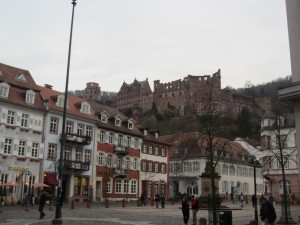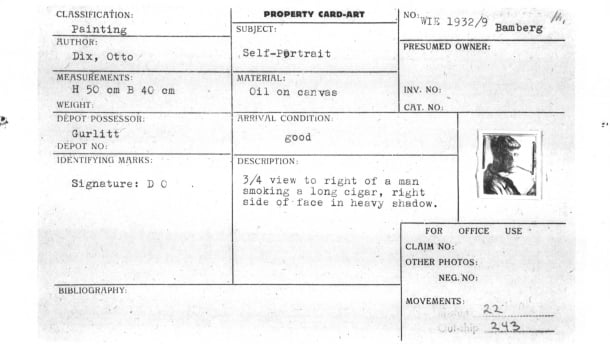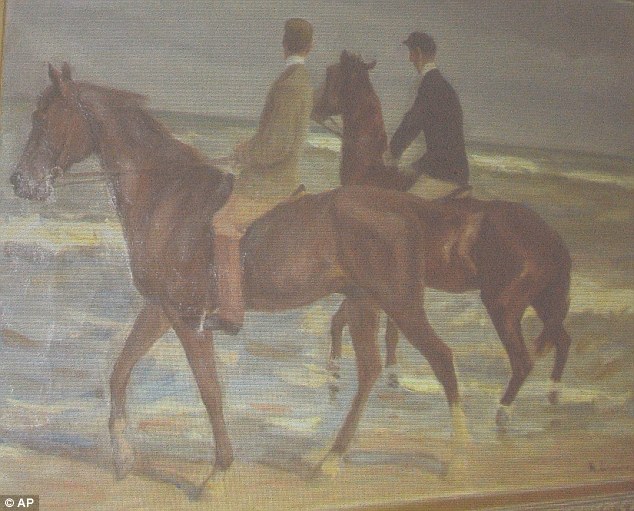Among the many legacies of the Gurlitt saga is a renewed focus on the importance of Nazi-approved art dealers like Karl Haberstock to the expropriation, outlawing, and re-sale of art either owned by Jewish collectors or which was thematically disapproved by the Nazi state. Relatedly, it has served as a reminder of the often cursory review that many of these men received after the war, and the acceptance of their proffered explanations, like those of Hildebrand Gurlitt, that “everything was destroyed in a bombing attack.” Now, the German Central Institute for Art history is set to make public the records of Adolf Weinmüller and his eponymous auction house (later renamed Neumeister).
The Next Gurlitt? Records from Weinmüller Auction House Made Available Online
Topics: Meike Hopp, Schwabinger Kunstfund, Was einmal war, Hildebrand Gurlitt, Cornelius Gurlitt, Zentralinstitut für Kunstgeschichte, Lost Art Database, Schwabinger Taskforce, Gurlitt Task Force, Nazi-looted art, Gurlitt Collection, Karl Haberstock, Kende, Entartete Kunst, Munich, Restitution, Wien, World War II, degenerate art, www.lostart.de, München, Adolf Weinmüller, Neumeister Auction House, Aryanized, Sophie Lille, Unser Wien ‘Arisierung’ auf Österreich, Nazi Raubkunst, Vienna, Tina Walzer
Cornelius Gurlitt’s Lawyers File Privacy Complaint
In one of the first affirmative steps taken by Cornelius Gurlitt since the revelation of the seizure of a large number of artworks with possible Nazi-seizure connections, Gurlitt has filed a criminal complaint concerning his allegations of violations of his privacy rights. According to Gurlitt’s attorney, “The surrender of investigative information to the press, and with it the severe damage to his personal rights is not tolerable in any way for Mr. Gurlitt. . . . This is a blatant violation of official secrecy.” Another of his lawyers went on to express concern for trust in the process in which details were being given to the media. In particular, Gurlitt’s team were most upset about photographs in the Focus piece that broke the story of Gurlitt’s apartment.
Topics: Stuttgart, Das Alte Schauspielhaus, Cologne, Irina Alter, veschollene Kunst, Schwabinger Kunstfund, Wiedergutmachung, Annette Weber, Hildebrand Gurlitt, Cornelius Gurlitt, Corinna Budras, S. Lane Faison, Universität Heidelberg, Augsburg, Institute for Jewish Studies Heidelberg, Aryanization, Anat Feinberg, Willi Korte, Schwabinger Kunstfund. Kunstfund München, Monuments Man, Gurlitt Task Force, Germany, Fall Gurlitt, Köln, Nazi-looted art, Henry Keazor, Gurlitt Collection, Appropriated Art the Gurlitt Case, Kurpfälzisches Museum Heidelberg, Hochschule für Judische Studien Heidelberg, Eberhard Karls-Universität Tübingen, Emily Löffler, CSU, Williams College, Judische Allgemeine, Hildebrand Gurlit, Entartete Kunst, Universität Zürich, Arisierung, Lehrstuhl für Römisches Recht und Privatrecht, Nürnberger Institut, Rückgabe, Rhein-Neckar Morgenweb, Beutekunst, 'Stürmer-Bibliothek', Magdeburg, Daniel Krochmalnik, Ersessene Kunst, Katja Terlau, Art Loss Recovery Unit, Jim Tobias, Rhein-Neckar Zeitung, Fritz Backhaus, Gurlitt, Bavaria, Johannes Heil, Wien, Sullivan & Worcester LLP, Lucas Elmenhorst, Kunsthistorisches Institut, Nürnberg, Jüdisches Museum Frankfurt, Looted Art, „Sturmer-Library“, degenerate art, Boston, Seminar für Neuere Geschichte, Wolfgang Ernst, www.lostart.de, Nazi art, Raubkunst, Nicholas M. O'Donnell, Frieder Hepp, Verjährung, Vienna, Münchner Kunstfund, New York, FAZ Frankfurt, Felicitas Heiman-Jellinek
Recap of Ersessene Kunst—Der Fall Gurlitt (Appropriated Art—The Gurlitt Case): January 26, 2014 in Heidelberg
I’ve just returned from my presentation in Heidelberg at the Hochschule für Jüdische Studien in Heidelberg at the conference Ersessene Kunst—Der Fall Gurlitt; Appropriated Art—The Gurlitt Case. The presentations were, without exception, outstanding. They ranged from rarely-told case stories, to sharp insights of some of the overarching principles that guide the the Gurlitt case and similar events. As the discussions made clear, this case will not be easily resolved. That in turn makes recent reports that Cornelius Gurlitt has indicated a willingess to discuss the art's return all the more significant.
Topics: Maria Altmann, Leopold Reidemester, Ministerin für Justiz und Kultur, Stuttgart, Das Alte Schauspielhaus, Cologne, Irina Alter, Portrait of Adele Bloch-Bauer, veschollene Kunst, Focus, Schwabinger Kunstfund, Aschbach Castle, Mussolini, Wiedergutmachung, Annette Weber, Monte Cassino, Cornelius Gurlitt, Corinna Budras, S. Lane Faison, Breslau, Universität Heidelberg, Augsburg, Aryanization, Anat Feinberg, Willi Korte, Schwabinger Kunstfund. Kunstfund München, Monuments Man, Jud Süss, Wrocław, Dresden, Gurlitt Task Force, Germany, Silesia, Fall Gurlitt, Wallraf-Richartz Museum, Köln, Nazi-looted art, Henry Keazor, Gurlitt Collection, Appropriated Art the Gurlitt Case, Schloss Aschbach, Die Welt, Kurpfälzische Museum Heidelberg, Hochschule für Judische Studien Heidelberg, Karl Haberstock, Eberhard Karls-Universität Tübingen, Emily Löffler, CSU, Williams College, Hildebrand Gurlit, Entartete Kunst, Universität Zürich, Arisierung, Lehrstuhl für Römisches Recht und Privatrecht, Württemberg, Schlesien, Nürnberger Institut, Hamburg, Otto Förster, Rückgabe, Beutekunst, 'Stürmer-Bibliothek', Magdeburg, Portrait of Amalie Zuckerkandl, Ersessene Kunst, Katja Terlau, Art Loss Recovery Unit, Jim Tobias, Hermitage, Gurlitt, Bavaria, Johannes Heil, Wien, Sullivan & Worcester LLP, Lucas Elmenhorst, Events, Kunsthistorisches Institut, Nürnberg, Jüdisches Museum Frankfurt, Looted Art, „Sturmer-Library“, degenerate art, Seminar für Neuere Geschichte, Wolfgang Ernst, Justizminister, Göring, www.lostart.de, Nazi art, Raubkunst, Nicholas M. O'Donnell, Frieder Hepp, Verjährung, Vienna, Claudius Krausharr, Münchner Kunstfund, Zwickau, Kajetan Mühlmann, New York, Werner Haftmann, FAZ Frankfurt, Felicitas Heiman-Jellinek
“Appropriated Art—the Gurlitt Case,” Heidelberg, Germany January 26, 2014
The Institute for Jewish Studies in Heidelberg (the Hochschule für Judische Studien Heidelberg) will host a one-day conference on January 26, 2014 entitled “Appropriated Art—The Gurlitt Case” (Ersessene Kunst—Der Fall Gurlitt). Leading academics, journalists, and researchers will put the Gurlitt find into a historical and legal perspective. As listed below, the depth of topics that will be presented is outstanding. Last, and very much least, I will present on the efficacy, challenges, and policy considerations in U.S. art restitution litigation.
Topics: Stuttgart, Das Alte Schauspielhaus, Cologne, Irina Alter, Schwabinger Kunstfund, Wiedergutmachung, Annette Weber, Hildebrand Gurlitt, Cornelius Gurlitt, Corinna Budras, Universität Heidelberg, Institute for Jewish Studies Heidelberg, Aryanization, Anat Feinberg, Fall Gurlitt, Köln, Nazi-looted art, Henry Keazor, Gurlitt Collection, Appropriated Art the Gurlitt Case, Kurpfälzische Museum Heidelberg, Hochschule für Judische Studien Heidelberg, Eberhard Karls-Universität Tübingen, Emily Löffler, Entartete Kunst, Universität Zürich, Arisierung, Lehrstuhl für Römisches Recht und Privatrecht, Nürnberger Institut, Rückgabe, Beutekunst, 'Stürmer-Bibliothek', Daniel Krochmalnik, Ersessene Kunst, Katja Terlau, Jim Tobias, Fritz Backhaus, Johannes Heil, Wien, Sullivan & Worcester LLP, Events, Kunsthistorisches Institut, Nürnberg, Jüdisches Museum Frankfurt, Looted Art, „Sturmer-Library“, degenerate art, Boston, Seminar für Neuere Geschichte, Wolfgang Ernst, Raubkunst, Nicholas M. O'Donnell, Frieder Hepp, Vienna, Münchner Kunstfund, New York, FAZ Frankfurt, Felicitas Heiman-Jellinek
German Museums Join in Demands for More Information About Gurlitt; Links to the Amber Room Theorized; Dix Painting Was Not Unknown
Der Spiegel reports today (link in German) about how German museums are joining the chorus of frustration about the lack of information about the Hildebrand and Cornelius Gurlitt collection find. From this perspective, this development is not a surprise. I was speaking to an international law class last night at Sarah Lawrence College, and one of the students asked me what the reaction in Germany would be. My feeling was that sooner rather than later, the German museum community, and likely the federal government, will push for a forward-looking solution. Present-day Germany takes questions about the Holocaust quite seriously, and for this collection to have turned up in Germany is sparking an embarrassment that could lead to more decisive action. The problem right now seems to be that everyone is waiting for someone else to make the first move.
Topics: Jeu de Paume, unbekannte Meisterwerke, February 13 1945, FAZ, Focus, Hildebrand Gurlitt, Dresden firebombing, Max Fisher, Cornelius Gurlitt, S. Lane Faison, Linz Führermuseum, Munich Central Collecting Point, Monopol, Wiesbaden Collecting Point, Dresden, HARP, Reinhard Nemetz, Max Liebermann, WWII, Monuments Men, Gurlitt Collection, Max Beckmann, Otto Dix, Degenerate Art: The Fate of the Avant-Garde in Naz, Auktionshaus Lempertz, Entartete Kunst, Fine Arts and Archives Program, Nazis, Marc Chagall, Organisation Todt, Paul Klee, Entdeckung verschollener Kunst, beschlagnahmte Bilder, Dresdner Bank, Belvedere, Fritz Todt, Holocaust Art Project, Hamburg Kunstverein, MFAA, Roberts Commission, Angela Merkel, Restitution, Wien, Monuments Fine Arts and Archives, Selbstporträt, World War II, degenerate art, Erben, Raubkunst-Bildern, Portrait of Wally, Washi, Löwenbändiger, Austria, Franz Marc, Oskar Kokoschka, Washington Principles, Ernst Ludwig Kirchner, München, Pablo Picasso, Dr. Herman Voss, Museums, Kristallnacht, Riders on the Beach, Hans Posse, Nazi Raubkunst, Vienna, Alfred Weidinger, Henri Matisse, Self Portrait, Emil Nolde
Focus Turns to Hildebrand Gurlitt’s Postwar Interrogation; Cornelius Gurlitt’s Whereabouts. Belvedere Official Questions Whether Collection Was Really a Secret
Topics: Jeu de Paume, unbekannte Meisterwerke, February 13 1945, FAZ, Focus, Hildebrand Gurlitt, Dresden firebombing, Max Fisher, Cornelius Gurlitt, S. Lane Faison, Linz Führermuseum, Munich Central Collecting Point, Monopol, Wiesbaden Collecting Point, Dresden, HARP, Reinhard Nemetz, Max Liebermann, WWII, Monuments Men, Gurlitt Collection, Max Beckmann, Degenerate Art: The Fate of the Avant-Garde in Naz, Auktionshaus Lempertz, Entartete Kunst, Fine Arts and Archives Program, Nazis, Marc Chagall, Organisation Todt, Paul Klee, Entdeckung verschollener Kunst, beschlagnahmte Bilder, Dresdner Bank, Belvedere, Fritz Todt, Holocaust Art Project, Hamburg Kunstverein, MFAA, Roberts Commission, Angela Merkel, Restitution, Wien, Monuments Fine Arts and Archives, World War II, degenerate art, Erben, Raubkunst-Bildern, Portrait of Wally, Washi, Löwenbändiger, Austria, Franz Marc, Oskar Kokoschka, Washington Principles, Ernst Ludwig Kirchner, München, Pablo Picasso, Dr. Herman Voss, Kristallnacht, Riders on the Beach, Hans Posse, Nazi Raubkunst, Vienna, Alfred Weidinger, Henri Matisse, Emil Nolde





